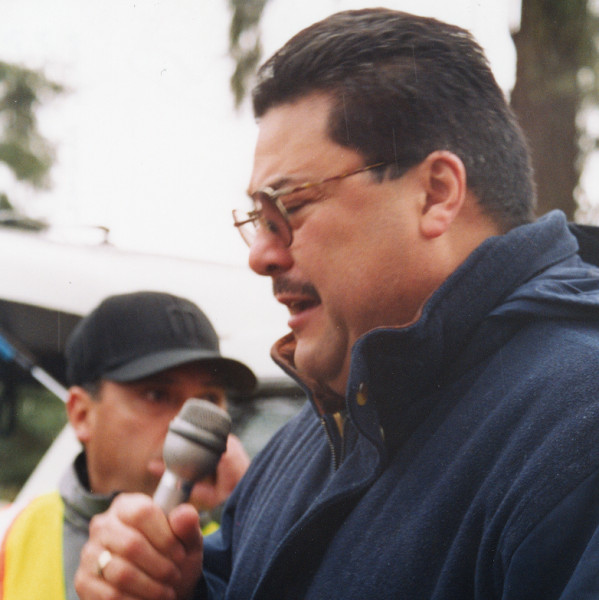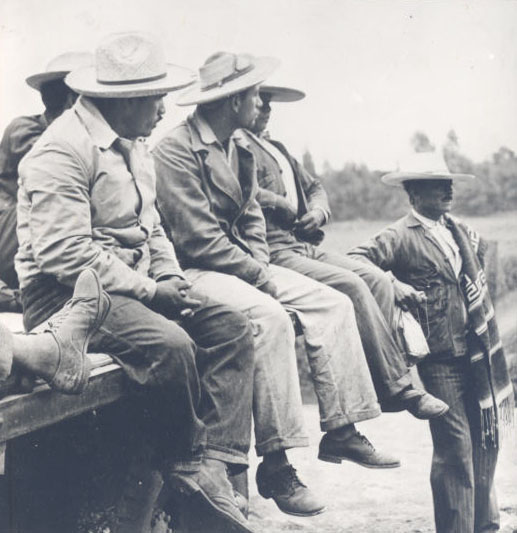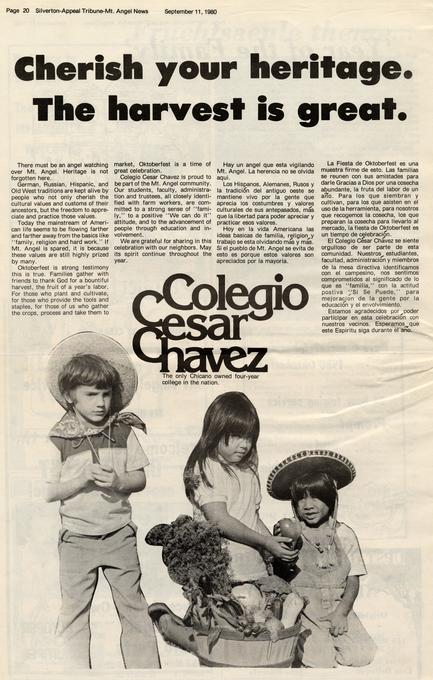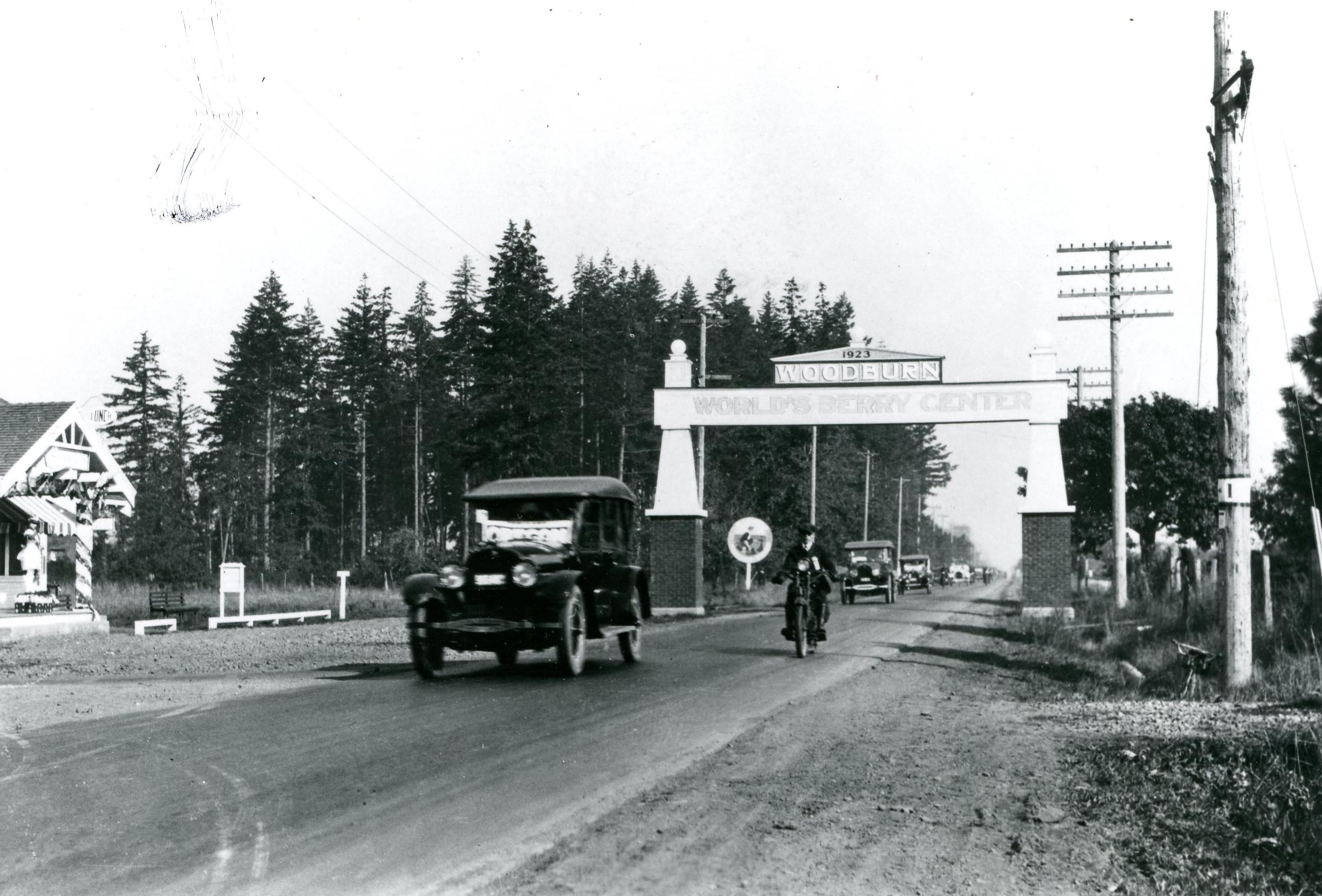Founded in April 1985, the Pineros y Campesinos Unidos del Noroeste (the Northwest Tree-Planters and Farmworkers United) is one of the largest organizations representing Latinas and Latinos in Oregon. Based in Woodburn, PCUN grew out of the work of the Willamette Valley Immigration Project (WVIP), a legal aid organization founded in 1977. In the twenty-first century, PCUN and its affiliated organizations are a major voice in the political and social life of the state.
As WVIP expanded its work with pineros—Latinx reforestation workers who by the early 1980s were a growing portion of WVIP's clients—its members realized the need to move beyond providing legal support and to begin organizing rural workers to stand up for their rights in their workplaces. Pineros, often farmworkers filling time in the winter months between harvest and planting seasons, worked in conditions that left them, much like Oregon’s farmworker population in general, vulnerable to exploitation. Both groups were hired for fixed contracts negotiated by contractors who used the immigrants’ often precarious legal status and lack of familiarity with U.S. culture and legal norms to extort low wages, and often in dangerous working conditions.
Recognizing that aid in immigration court often came too late to help workers, WVIP decided to incorporate PCUN, bringing pineros together with farmworkers whose mobility, lack of regular employment, often precarious immigration status, and vulnerability to exploitation by unscrupulous contractors—as well as shared language and cultural background—put the two groups of workers in similar situations.
Early PCUN leaders were veterans of WVIP. Cipriano Ferrel, a veteran of the United Farmworkers, originally from Delano, California, and a graduate of Colegio César Chávez in the City of Mt. Angel, served as president until his death in 1995. Ramón Ramírez, originally from Los Angeles and also a graduate of Colegio César Chávez, was vice president and, after Ferrel’s death, president from 1995 to the present. Larry Kleinman, an immigrants’ rights activist originally from Chicago, was PCUN’s secretary-treasurer from 1988 until 2013.
From the beginning, PCUN pursued a multi-pronged approach to serving Oregon’s rural Latinx workers, combining direct action in the fields, solidarity with other groups (religious organizations, progressive political movements, and other unions), and legislative advocacy at the state and national levels. Under the Immigration Reform and Control Act of 1986, PCUN signed up over 1,300 undocumented immigrants for legal amnesty—10 percent of all such cases processed in Oregon. Throughout the late 1980s and 1990s, the union was also a major partner in the movement to monitor and control the use of toxic pesticides in Oregon's farms and forests. PCUN has been an important advocate for increasing the minimum wage and granting collective bargaining rights to farmworkers, who are exempt from the legal rights to organize given to other workers under the National Labor Relations Act. With the decline of reforestation contracts since the 1980s (reforestation contracts peaked in 1991), PCUN's support for pineros has been felt most strongly through these legislative battles, with their workplace organizing efforts focused on the fields.
In the fields, PCUN took inspiration from the United Farmworkers’ success in California during the 1960s and 1970s. Most notable among its organizing campaigns were a ten-year boycott (1992-2002) of the NORPAC company in support of workers trying to organize farms in the Mt. Angel area; the 1995 Tenth Anniversary Campaign that significantly increased union membership in the Willamette Valley; and a 2001 organizing campaign by workers at the PictSweet Mushroom plant in Salem. The union has been most successful at organizing among farmworkers in the Willamette Valley, with considerably less presence in other agricultural areas like the Rogue River Valley.
PCUN has also been active beyond the workplace, helping to found the Farmworker Housing Development Corporation (1990), which provides affordable housing to farmworkers in Woodburn, and CAUSA (1996), a political organization for Oregon’s Latinx community. PCUN has several affiliate organizations, including the Mujeres Luchadoras Progresistas (Women Fighting for Progress), started in 1993 to provide education, leadership development, and economic opportunities for women in farmworker communities; and the radio station KPCN-LP, Radio Movimiento, started in 2006 as a low-power FM station broadcasting in the Woodburn area. In 2011, PCUN started the CAPACES Leadership Institute, a youth education and leadership development organization whose trainees include the institute's current Executive Director and PCUN’s former secretary-treasurer, Jaime Arredondo.
-
![Ramon Ramirez (PCUN) addresses marchers in 2004]()
Ramon Ramirez (PCUN) addresses marchers in 2004.
Ramon Ramirez (PCUN) addresses marchers in 2004 Courtesy Oregon State University Libraries, RG229
Related Entries
-
![Bracero Program]()
Bracero Program
The Mexican Farm Labor Program, also known as the Bracero Program, was …
-
![Colegio César Chávez]()
Colegio César Chávez
Colegio César Chávez, located in Mt. Angel in the lower Willamette Vall…
-
![Latinos in Oregon]()
Latinos in Oregon
The arrival of Latinos in Oregon began with Spanish explorations in the…
-
![Woodburn]()
Woodburn
Woodburn has always had a dynamic identity. Located in French Prairie i…
Related Historical Records
Map This on the Oregon History WayFinder
The Oregon History Wayfinder is an interactive map that identifies significant places, people, and events in Oregon history.
Further Reading
Pineros y Campesinos Unidos del Noroeste official website, “History of PCUN” http://www.pcun.org/about-pcun/history-of-pcun/
Sarathy, Brinda. Pineros: Latino Labour and the Changing Face of Forestry in the Pacific Northwest. Vancouver: UBC Press, 2012.
Sifuentez, Mario Jimenez. Of Forests and Fields: Mexican Labor in the Pacific Northwest. New Brunswick, NJ: Rutgers University Press, 2016.
Stephen, Lynn. The Story of PCUN and the Farmworker Movement in Oregon, rev. ed. (Eugene, Ore.: Dept. of Anthropology, University of Oregon, 2012), http://cllas.uoregon.edu/wp-content/uploads/2010/06/PCUN_story_WEB.pdf





